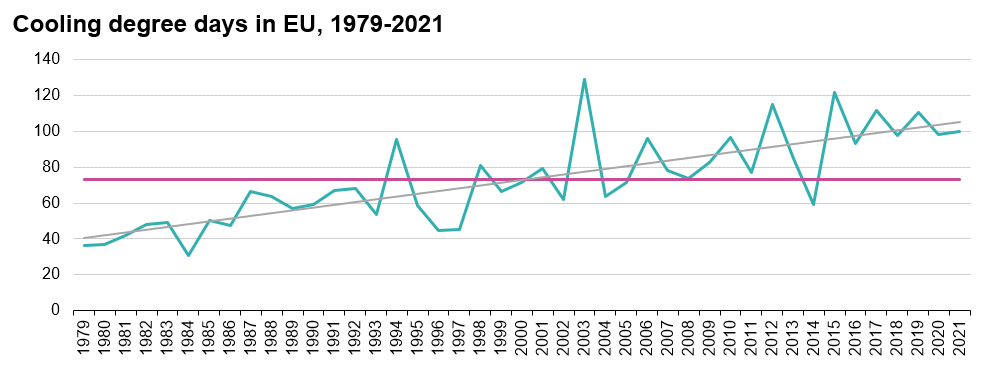The sharp increase in refrigeration needs should be better reflected in public policies
Recently released degree-day indicators confirm the steady progression of cooling needs compared to heating in the EU. Globally, energy consumption from refrigeration (including air conditioning) is expected to exceed that from heating by around 2060.
On May 31, 2022, Eurostat, the statistical office of the European Union, published new data on cooling degree days (CDDs) and heating degree days (HDDs) illustrating respectively the evolution of cooling* and heating needs of buildings as a function of outdoor temperatures in the European Union.
The calculation of CDDs relies on the base temperature, which is defined as the highest mean daily air temperature that does not result in indoor cooling. The value of the base temperature depends in principle on several factors associated with the building and the surrounding environment. Using a general climatological approach, the base temperature is set at a constant value of 21°C in the CDD calculation. Only the days when the daily mean air temperature is equal to or above 24°C are considered for this calculation. These calculations are executed on a daily basis, added up to a calendar month and subsequently to calendar years.
Eurostat underlines how the need to cool a given building has increased over time, with average cooling degree days (CDD) values being almost three times higher in 2021 (100) than in 1979 (37). The result in the EU is an average increase of 170% in the theoretical air conditioning needs of buildings in 42 years (see the evolution of CDD in the table below).

CDD values vary between EU countries. In the last observed year (2021), the countries with the highest values were Malta (793), Cyprus (732) and Greece (421).
In contrast, heating degree days (HDD) values decreased by 11% between 1979 and 2021 in the EU, resulting in heating needs equivalent in 2021 to 89% of the 1979 needs.
Eurostat points out that indicators such as HDD and CDD can help monitor the changes in energy demand for cooling and heating of buildings in the context of climate change.
These indicators clearly show a sharp increase in cooling needs. Thus, according to the EU, by 2030 the energy used to cool buildings across Europe is likely to increase by 72%, while the energy used for heating buildings will fall by 30%. (2)
Globally, according to the IEA (3), space cooling needs in the buildings sector required only 15% of the energy used for heating in 2019. However, cooling degree days are expected to increase by 50% by 2050 up to 70% by 2070, depending on the region and climate change impact on temperature rise. Consequently, cooling demand is expected to grow at more than 3% per year over the next three decades, eight times faster than heating demand over the past 30 years.
Other projections suggest that by 2060, the amount of energy used worldwide for cooling will overtake that used for heating. (4)
However, this growing importance of refrigeration* (including air conditioning) and related technologies is probably not yet fully accounted for in the European Union’s strategy towards the objective of a carbon-neutral energy system by 2050. Thus, the roadmap on policy support for heating and cooling decarbonisation just published by the European Commission on June 13, 2022, focuses mainly on heating. (5)
* The term "cooling", used in the sources cited and taken up in this article, refers to the cooling of spaces and is equivalent to "air conditioning". The definitions of “cooling” and “refrigeration”, endorsed by the IIR and ASHRAE, are specified here.
Sources:
(3) https://www.iea.org/commentaries/is-cooling-the-future-of-heating
(4) https://www.sciencedirect.com/science/article/abs/pii/S0301421508005168
(5) Policy support for heating and cooling decarbonisation Roadmap : https://op.europa.eu/en/publication-detail/-/publication/f5118ffc-eabd-11ec-a534-01aa75ed71a1/language-en
